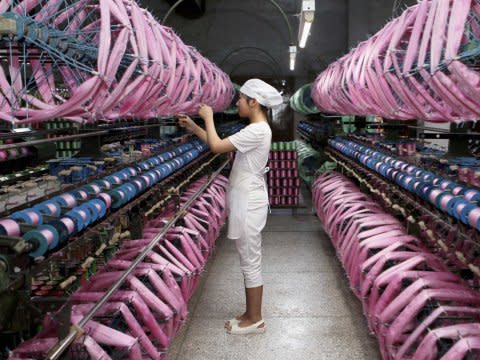New Chinese Economic Data Will Force A Lot Of Economists To Crank Up Their Growth Forecasts

REUTERS
An employee works inside a silk factory in Neijiang, Sichuan province, July 3, 2013. China's economy is expected to grow 7.6 percent in the second half of 2013.
China just released five key economic data points overnight.
Here's a quick run-down:
Consumer prices rose 2.7% year over year in July, representing an unchanged inflation rate from June. Economists were expecting a pickup to 2.8% inflation.
Producer prices fell 2.3% year over year in July after dropping 2.7% in June. Economists had predicted a 2.1% fall in prices in July.
Fixed asset investment year-to-date rose 20.1% from 2012, matching June's YTD rise. Economists had predicted a tick down to 20% growth year over year in July.
Chinese industrial production rose 9.7% year over year in July, well above economists' expectations for an 8.9% growth rate, unchanged from June.
Retail sales grew 13.2% year over year in July, slowing from June's 13.3% growth rate and missing economists' forecasts for a pickup to 13.5% growth.
"Among the data points, the most important upside surprise is [industrial production] growth," says Deutsche Bank economist Jun Ma. "This is also the highest [industrial production] reading since Jan-Feb. By sector, the [year-over-year industrial production] growth of the steel sector accelerated by 1.8 [percentage points], that of auto by 2.1 [percentage points], and that of power by about 3 [percentage points]. We believe that the demand for heavy manufacturing is beginning to recover, led partially by the stabilization of the inventory cycle and partially by the rise in corporate confidence due to the mini stimulus measures announced since the beginning of July."
BofA Merrill Lynch economist Ting Lu says the better-than-expected industrial production data should move markets.
"By considering the rebounding official PMI and trade data as well as the subdued inflation readings in July, we expect today’s data will have quite a positive impact on commodities, commodity-related currencies and some Chinese stocks (especially cyclical names exposed to [fixed-asset investment])," says Ting. "We believe many Street economists will likely revise up their 3Q GDP growth forecasts soon."
While inflation came in below expectations, Credit Suisse analysts Weishen Deng and Dong Tao see a pickup on the horizon.
"This [consumer price index] print is lower than expected, however, we believe that the upward price pressure persists and inflation uncertainties remain high going forward," writes the Credit Suisse team in a note. " The only factor that caused the negative surprise in this month is the large sequential decline in the fresh fruits prices. However, this is the item that usually comes with smaller dynamic weighting, and it is a more volatile component of the CPI basket. Prices for those more persistent components with higher weights were actually on the rise, such as pork prices, rental costs, and residential service costs. These will likely bring upward pressure to CPI inflation in the coming months, in our view. "
Yifan Hu of Haitong Securities points to the July fixed asset investment data as a sign that investment is bottoming.
" Jan-July China [fixed asset investment] growth stabilized at a low level, and likely to bottom out on more supportive policies following the first wave of measures," says Yifan. "Infrastructure projects supported by 'new urbanization' policy will continue to play an important role."
Yifan also says retail sales data are bottoming out.
"The deceleration of retail sales reflected remaining weak demand, but likely to bottom out," she writes in a note. "We expect retail sales growth to accelerate in [the second half of 2013] along with announcement of supportive policies on consumption. 'Information Consumption' is to be a new highlight promoted by the State Council , who targets information consumption to reach RMB 3.2 trillion by 2015. It will consequently to pull up internet equipment sales to grow by 30% per year to reach RMB 2.4 trillion by 2015; and meanwhile, online retail sales and B2B business are expected to rise significantly and reach RMB 1.2 trillion and RMB 18 trillion respectively by 2015."
The Aussie dollar – seen as a proxy for risk sentiment toward China, given Australia's large commodity exports to the country – is trading 0.5% higher against the U.S. dollar this morning on the news.
More From Business Insider

